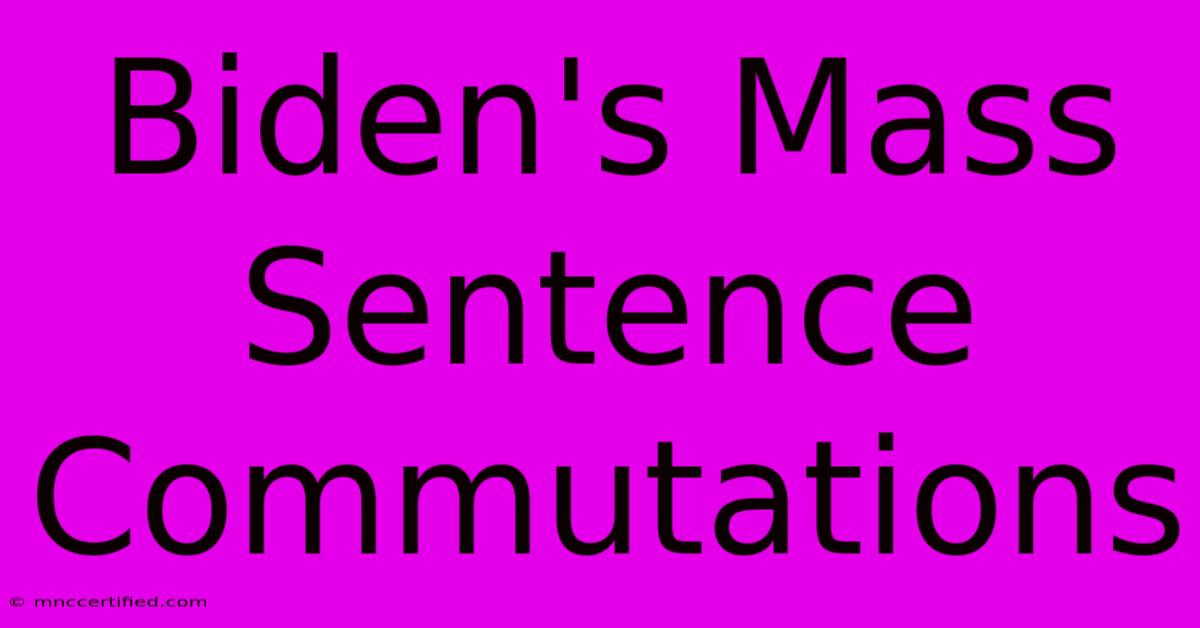Biden's Mass Sentence Commutations

Table of Contents
Biden's Mass Sentence Commutations: A Deep Dive into Clemency and Reform
President Biden's approach to criminal justice reform has been marked by a series of mass sentence commutations, significantly impacting the lives of numerous individuals incarcerated for non-violent drug offenses. This article will delve into the specifics of these commutations, exploring their impact, the rationale behind them, and the ongoing debate surrounding their effectiveness.
Understanding the Scope of Biden's Commutations
Unlike a pardon, which completely wipes a conviction from a person's record, a commutation reduces a sentence. President Biden's actions represent a significant step in addressing the long-standing issue of mass incarceration, particularly concerning the disproportionate impact on minority communities affected by harsh drug sentencing guidelines. While the exact numbers fluctuate, his commutations have freed hundreds of individuals, many serving lengthy sentences for drug-related crimes. These weren't isolated cases; they were part of a deliberate, targeted effort to reform sentencing practices deemed overly punitive.
Key Characteristics of the Commuted Sentences:
- Non-violent drug offenses: The overwhelming majority of individuals receiving commutations were convicted of non-violent drug offenses. This reflects a growing national consensus that lengthy sentences for drug possession, particularly for low-level offenses, are counterproductive and contribute to mass incarceration.
- Focus on rehabilitation: The administration emphasized a focus on rehabilitation and reintegration into society. Many of the individuals selected for commutations had demonstrated positive behavior while incarcerated, participating in programs aimed at improving their chances of success upon release.
- Equitable application: While specific criteria weren't publicly released, the administration aimed for an equitable approach, seeking to address historical disparities in sentencing and incarceration rates. This involved considering factors like race, socioeconomic background, and the length of time served.
The Rationale Behind the Commutations:
The Biden administration's justification for these mass sentence commutations centers on several key arguments:
- Overly harsh sentencing: The existing sentencing guidelines for drug offenses were considered excessively punitive, leading to lengthy prison terms that don't align with the severity of the crimes committed.
- Racial disparities: Drug sentencing disproportionately impacted minority communities, perpetuating systemic inequalities within the justice system.
- Cost-effectiveness: Reducing prison populations through commutation can lead to significant cost savings for taxpayers. This includes reduced spending on incarceration, healthcare, and other related expenses.
- Promoting rehabilitation: Focusing on rehabilitation provides a more effective approach to reducing recidivism than lengthy incarceration, leading to safer communities.
The Impact and Ongoing Debate:
While the commutations have undeniably impacted the lives of hundreds, the long-term effects are still being evaluated. The success of these efforts hinges on the availability of resources for reintegration, including job training, housing assistance, and mental health support. The debate continues on several points:
- Effectiveness of rehabilitation programs: Are existing programs sufficient to support successful reintegration and reduce recidivism rates among those released?
- Public safety concerns: Some express concern about the potential for increased crime rates following the release of individuals convicted of drug offenses.
- Political considerations: The commutations have been praised by supporters of criminal justice reform but criticized by those who believe they compromise public safety.
Future Directions and Implications:
President Biden's actions have set a precedent for future administrations. The long-term success of his clemency initiatives will depend on ongoing monitoring, evaluation, and a commitment to comprehensive criminal justice reform. This includes addressing the root causes of crime, investing in community-based support services, and continuing to reassess outdated sentencing practices.
This move reflects a growing shift in the national conversation around criminal justice reform, moving away from purely punitive approaches toward a more holistic model emphasizing rehabilitation, equity, and the reduction of mass incarceration. The lasting impact of these commutations remains to be seen, but they represent a significant turning point in the ongoing effort to create a more just and equitable criminal justice system.

Thank you for visiting our website wich cover about Biden's Mass Sentence Commutations. We hope the information provided has been useful to you. Feel free to contact us if you have any questions or need further assistance. See you next time and dont miss to bookmark.
Featured Posts
-
How Gukesh Became Youngest Gm
Dec 13, 2024
-
Domestic Violence Arrest For James Kennedy
Dec 13, 2024
-
Open Ai Upgrades Chat Gpt Voice With Video
Dec 13, 2024
-
Super League Attendance 2023 2024 Rank
Dec 13, 2024
-
Max Georges Christmas Hospitalization
Dec 13, 2024